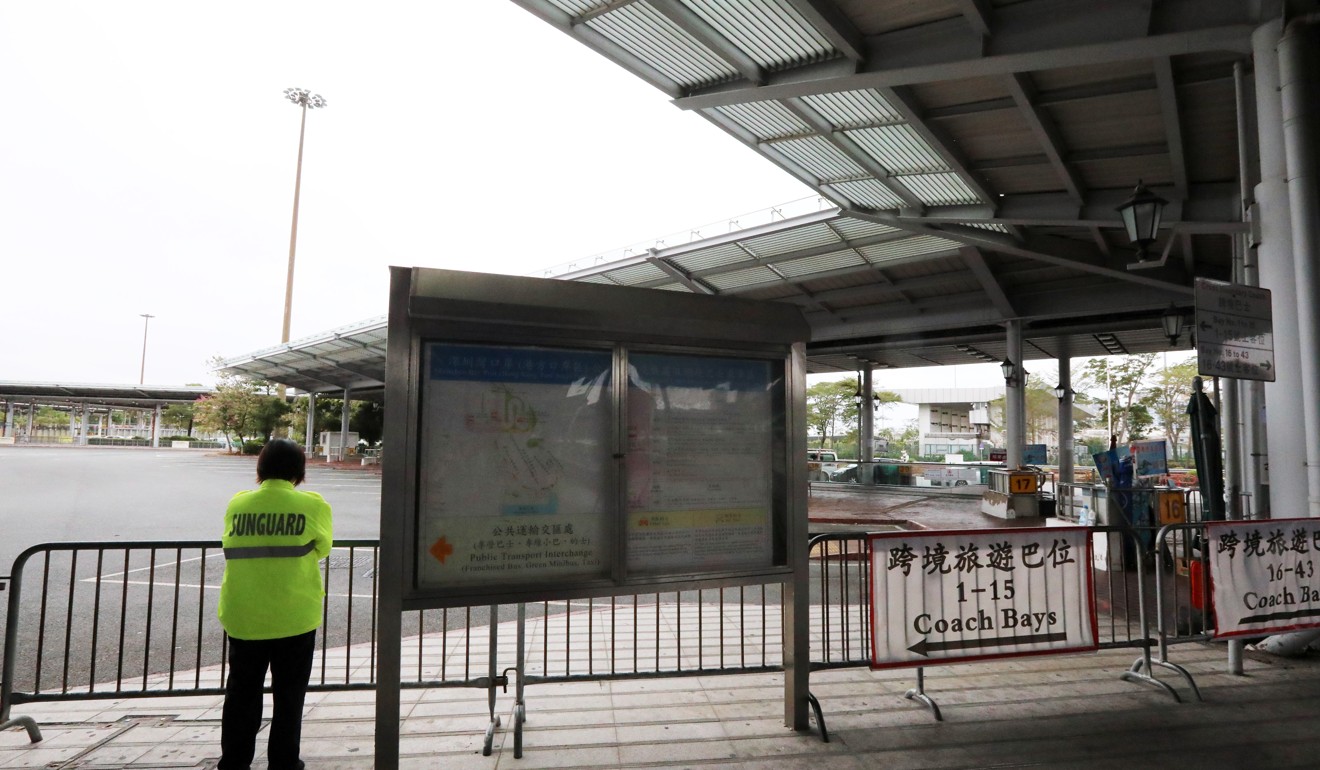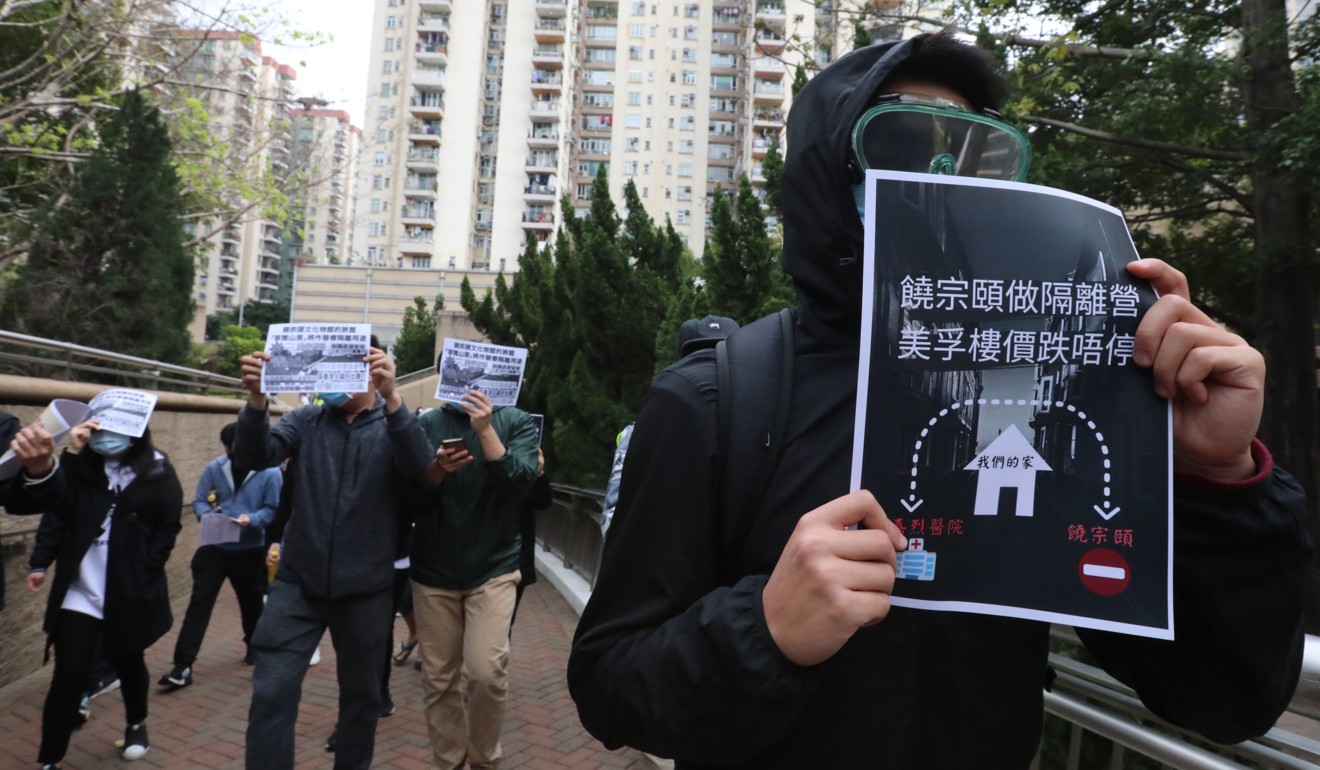
Coronavirus: with 468 quarantined on Day 1 of border scheme, officials ask for understanding as facility needs grow
- ‘Three of our camps are getting full, and we might need more camps if the epidemic continues,’ the food and health secretary told a radio programme
- Random checks on the self-quarantined by police had so far turned up no rule-breaking, she said

Hong Kong officials asked for understanding from the public on Sunday as they revealed 918 cross-border travellers had been placed in quarantine on the first two days of the new plan’s implementation, and conceded more facilities would likely be necessary to handle them.
Secretary for Food and Health Sophia Chan Siu-chee said the number was up from the 161 mandatory cases Chief Executive Carrie Lam Cheng Yuet-ngor cited at a Saturday press conference.
Of the total quarantined as a coronavirus outbreak control measure, 814 were Hong Kong residents returning from mainland China, while the other 104 were mainland tourists, of which 12 were placed in government quarantine facilities.
But the growing numbers were likely to mean more quarantine sites would need to be activated, Chan told a radio programme.

“We hope the public can be more understanding and cooperative, as three of our camps are getting full, and we might need more camps if the epidemic continues,” she said, citing cases of vandalism at some planned quarantine facilities.
Her remarks came amid continued opposition by local residents and district councillors to having housing estates and clinics in their neighbourhoods employed in that role, along with fresh calls for civil servants and scouts to help at quarantine locations.
A government spokesman said the three holiday camps were full, and the Heritage Lodge, a hostel in Lai Chi Kok, was ready to be used as the fourth quarantine camp this week.
The new quarantine measures, which require anyone entering the city from the mainland to be quarantined for 14 days, took effect at midnight on Friday. Local residents are expected to self-quarantine at home, while non-locals will be put into camps or hotels.
“The checks [by police] will continue. Apart from visiting their homes, officers might also call and ask people to share their real-time location via their mobile phones,” Chan said, adding, that so far, police had carried out 10 random checks and found no one breaking the rules.
Those violating the order face a maximum fine of HK$25,000 (US$3,220), six months in jail, or both.
While quarantine efforts are now under way, the government is still facing fierce opposition from local residents unhappy to have such facilities in their neighbourhoods.
The Hospital Authority said an air conditioner at a clinic in Kwai Chung was vandalised on Saturday. Police are investigating the case as arson.
These quarantine sites are very safe, and the distance from residential areas is more than sufficient to stop the virus from spreading
The clinic is one of 18 facilities designated to screen patients exhibiting minor respiratory symptoms.
The authority is set to use seven of them for that purpose initially, but has not revealed which ones will be used.
Chan said the clinics were needed for early detection of potential coronavirus cases, warning that damage to such facilities would affect the fight against the outbreak.
Dr Lam Ching-choi, an adviser to the chief executive on the city’s Executive Council, also weighed in, urging residents not to oppose plans for designated quarantine zones and clinics.
“These quarantine sites are very safe, and the distance from residential areas is more than sufficient to stop the virus from spreading,” Lam said on a television programme. “We have to have faith in science and these experts.”
The government had earlier shelved plans to use a new public housing estate in Fanling as a quarantine facility after facing strong opposition, but authorities were now eyeing the Chun Yeung Estate in Fo Tan.
Elsewhere, residents have protested against the use of a hostel at the Jao Tsung-I Academy in Lai Chi Kok. It lies 10-minute’s walk from the Mei Foo Sun Chuen estate.
Such resistance has extended to clinics designated for those showing symptoms as a way of relieving the burden on packed hospitals.

“We appeal to the public not to oppose these clinics – your neighbours or family members may one day need them,” Lam Ching-choi said.
With the need growing for both facilities and manpower, the Home Affairs Bureau has also contacted the Scout Association of Hong Kong (SAHK) seeking adult volunteers to assist at quarantine campsites.
“The service is voluntary, and we would brief our scout members in detail, and for those who are willing to join, we will make sure they have enough protective equipment,” an SAHK statement said.
According to a source, volunteers would mainly be tasked with delivering supplies, patrolling or assisting in briefings at two camps. Two volunteers in each camp would be needed for eight hours each day.
Chief Secretary Matthew Cheung Kin-chung had previously appealed to all department heads to release civil servants willing to take up non-medical tasks related to Saturday’s new quarantine measures.
According to an internal memo, volunteers might have to conduct spot checks to see if those quarantined at home had breached the order. Others could staff quarantine facilities, call those restricted to their homes and help arrange the delivery of meals and essential supplies to residences and camps.
However, at least three civil servants have told the Post that despite senior officials telling them involvement in the coronavirus response was voluntary, they were still assigned to quarantine-related duties.